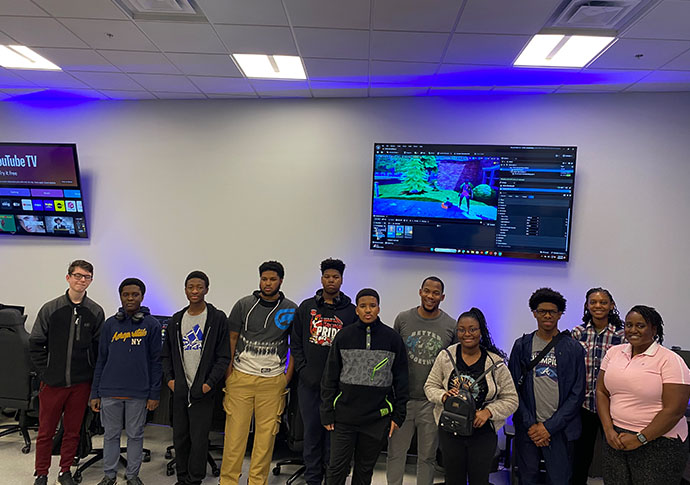Georgia Power, the Cxmmunity Foundation Join Forces to Encourage Careers in Tech, esports
All gamers want to do is game. But as these same gamers grow, they receive the message that gaming isn’t a viable career option.
Denise Moore hopes to eliminate that narrative for the next generation.
“People may sit there and think gaming is a multi-billion dollar industry and that all people are doing is playing esports,” Moore said. “And it's like, no, every one of those organizations and industries that you're looking at, they’ve got an HR department. They have a marketing department. They’ve got lawyers. They have all those things to see yourself in this industry if that's where you want to be. … Gaming is everywhere. So let's look at how we can go and not only be consumers, but producers.”
Moore is preaching from a place of experience. She spent the first seven years of her career as a teacher, thinking the closest she’d come to working in gaming was “gamifying” her classroom and relating to her students through the games she loves. But now, she’s living her passion and making use of her teaching experience as the current Director of Education at the Cxmmunity Foundation.

A nationwide non-profit founded in 2019, The Cxmmunity Foundation teaches minority middle through college students about the fields of science, technology, engineering, arts, and mathematics (STEAM) and creates opportunities in the video game and digital entertainment industries.
To kick off 2025, the Cxmmunity Foundation and Georgia Power teamed up for two free game development workshops at downtown Atlanta’s new Martin Luther King, Jr. Recreation and Aquatic Center’s esports lab. The esports lab — created by the Cxmmunity Foundation, the Atlanta Department of Park and Recreation, and fellow non-profit, Sole Circle Foundation — is part of an initiative by City of Atlanta officials to educate students about careers in the gaming industry while eliminating hurdles like access to high-speed internet and expensive gaming PCs.
esports — the term for video game competition either in organized, multiplayer format or individually — is one of the fastest growing activities for kindergarten through university students in the United States. According to the Cxmmunity Foundation, 83 percent of minority teens play videos games opposed to 71 percent of Caucasian teens. However, only 14 percent of video games include Latino and Black creators, in contrast to 68 percent of games include Caucasian creators — one of the reasons Moore didn’t see a path for herself in the gaming industry. She said the consequences of the lack of diversity in the industry itself is seen poignantly in early iterations of one of her favorite games since childhood, The Sims.
“There was such a lack of diversity in that character creation down to the hair textures down to the skin complexions,” Moore said. “It wasn't even so much as they didn't have it, but the dark skin complexions looked gray. Creators didn't have that understanding, so having people in the room is what I want to see. I want to have the people in the room that could give you that understanding of representing different cultures and doing it correctly to make sure that you’re addressing the concerns and the stereotypes. … Having that level of voice and opinion is going to make the games more realistic and more relatable.”
That representation those like Moore and her team are working to promote has already proved powerful.
Shandra and her 10-year-old son, Faraji, had been attending the recreation center’s esports Lab classes for a few weeks when they stumbled into the Cxmmunity Foundation and Georgia Power’s middle and high school workshop on Feb. 8. Shandra said her family recently returned from living overseas where Faraji attended international schools which emphasized training in information, computers, and technology (ICT), something not commonly found in American schools.
“It was really important to me if we moved back to the United States to make sure that I kept him going with that technology education and making sure that he continued to develop an interest in technology, gaming, and coding,” Shandra said. “When I told him about the idea of the esports club, he was super excited to participate because he feels like there are other kids that are going to have the same interest as him here.”
During the college student workshop on Jan. 25, Morehouse College junior Ezra shared he originally went to Morehouse for ROTC to follow in his mother’s footsteps, but before stepping foot on campus, was enraptured by technology and began building his first PC. Soon after, he found the Cxmmunity Foundation.
Now a junior business administration major, Ezra credits the Cxmmunity Foundation for his already impressive resume: engagement coordinator at the Cxmmunity Foundation, Georgia esports League Commissioner, Ambassador for Ghost Gaming, and co-founder of Morehouse’s gaming club, Maroon Tiger Gaming. He said the Atlanta-based non-profit also helped him find opportunities like internships, a student ambassadorship, and attending PAX West where he ran the Cxmmunity Foundation booth and networked.
“The Cxmmunity Foundation leaders are my mentors,” Ezra said. “They push me to talk to people. They push me their network. They push me to really get my value out of the time that I'm putting in at Morehouse and out of the time that I've been putting into developing this program. I'm really thankful to be able to take that and now offer opportunities to other members and students that come behind me.”
To learn more about the Cxmmunity Foundation and its work with middle, high school, and college students, visit its website.